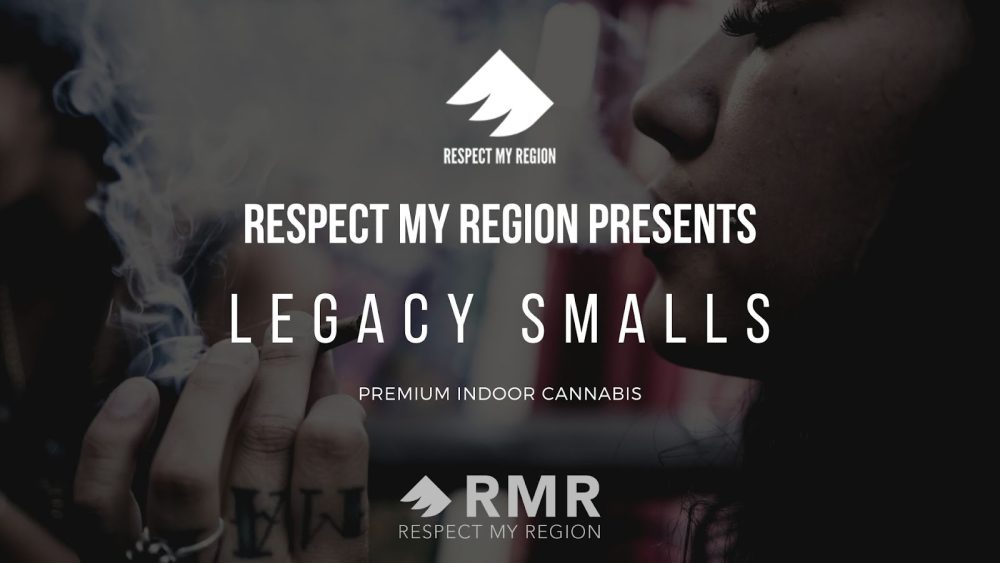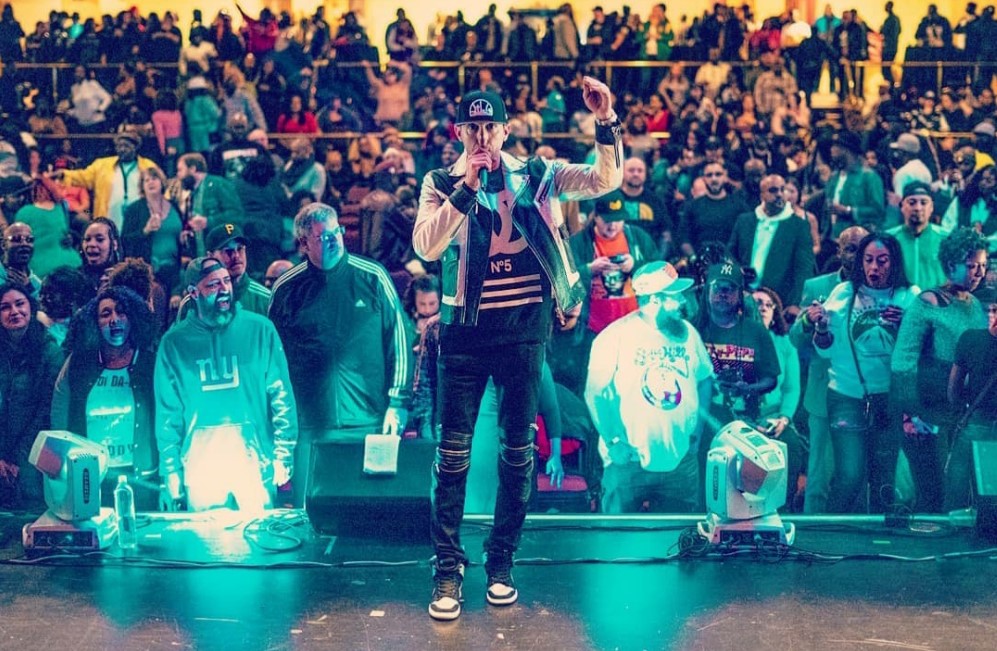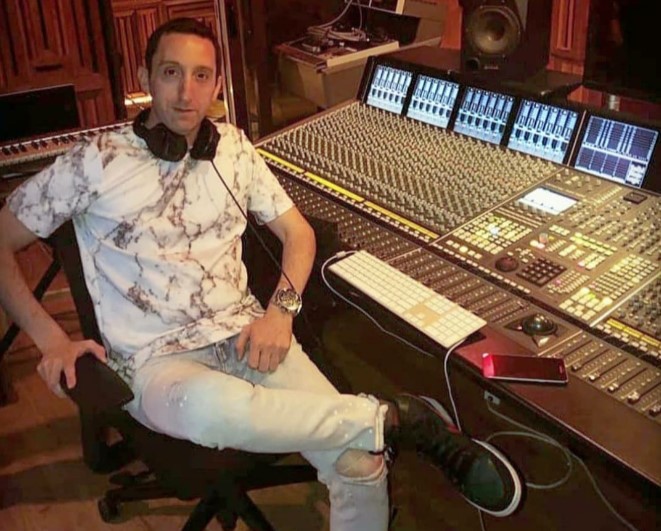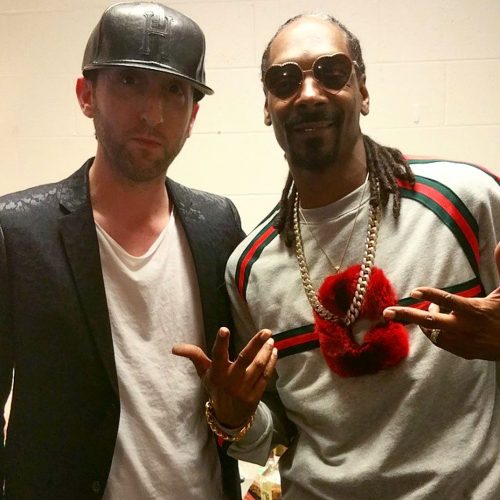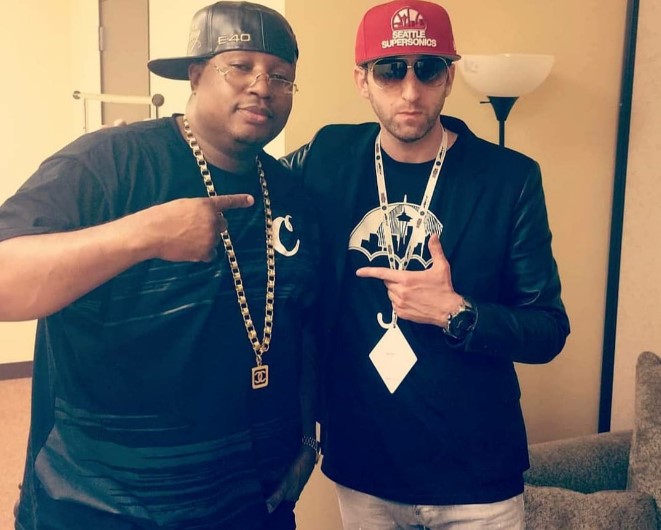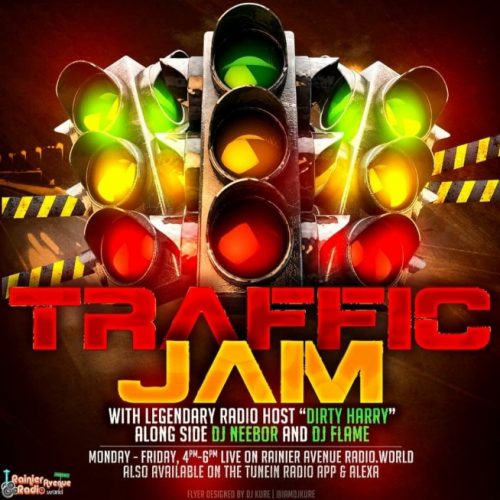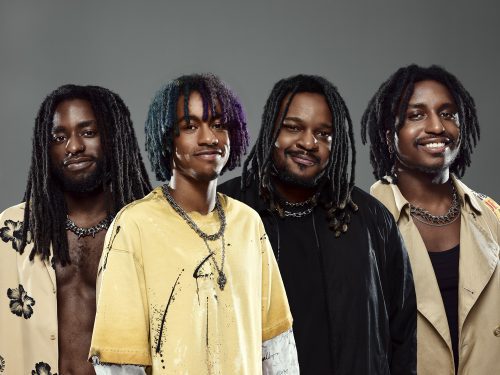Dirty Harry has longtime been a radio personality in Seattle, working closely with some of the biggest names in the music business. Over his career, he has built and maintained important relationships that developed from his time at Def Jam and his time as an award-winning radio show host on KUBE 93.
Currently, he is on the air hosting Traffic Jam, a segment on Rainier Avenue Radio from 4-6 pm on weekdays that showcases the hottest talents in today’s music. He is taking everything he has learned over the years and is helping nurture upcoming talents through management and consulting.
“I love working with artists, if there are any opportunities to work with them on the management or on the consulting side. People gave me that opportunity to create the pathway that I chose to brand and develop into what I’ve been fortunate and blessed to be able to do and I want to be able to help others do the same.”
Photo from Instagram @dirty_harry_206
Dirty Harry Talks Creating His Pathway From Def Jam To KUBE To Rainier Avenue Radio
(Lightly edited for clarity)
Dirty Harry: Getting Started In The Music Business
I really wanted to get together and talk because I know you have done a lot, I’m familiar with your time at KUBE 93, but I only know little snippets and wanted to hear about your full journey, how it’s led you to Rainier Avenue Radio and what you think your next step is.
Really, my journey started with taking my two sisters, years and years ago, for math tutorial help at this place called Kumon Math Center. Every time that I would go in there, I would hear this blaring loud music coming from the other side of the wall. So, I decided to knock on the door one day. A gentleman by the name of DJ Nasty Nes had a large music management company (Crazy Pinoy Promotions) and I asked if I could start coming up after school every day and help to load up vinyl and CD’s, organize the DJ conference calls, and help collaborate the efforts that needed to be put into play. Did that every day and one day he takes the keys out of his pocket, and I’m a junior in high school at Roosevelt, throws them across the table and says, “I want to focus on getting more into the LA market, I see your work ethic and I want you to come up every day and help run things.”
https://www.instagram.com/p/BxJGaANHdPX/
Fast forward, I finish school and there was an opportunity at Def Jam, they needed a Northwest rep and I applied for it. I got the position and told Def Jam that I wanted to be local, didn’t want to have to move to LA. They were okay with it and they put me down in Pioneer Square.
Spent two years with Def Jam and KUBE 93 was one of my radio stations. So, when LL Cool J was here with Foxy Brown, and Memphis Bleak, and David Banner, and early Jay-Z material, it was my job to make sure that these artists were being played on all of my radio stations and all of my markets. If they weren’t being played, I had to figure out how to get them played. I’d have to do lunches and dinners with program directors and music directors, and I saw something about radio and broadcasting. I’d seen these radio hosts and other markets developing these pretty large platforms. I had a conversation with the program director at the time and I said, “What do you think about me putting together an aircheck?”
So, I put together an aircheck and he said, let’s get you on weekends, and let’s get you on nights. I kind of had the best of both worlds; weekends, nights, then Def Jam during the week. Went back to Def Jam and said, “I might be making the dumbest decision of my career…” but you just kind of know it in your gut and I just felt like radio was my calling. That was late ’97, early ’98, and I ended up staying at KUBE through 2017.
Over my tenure at KUBE, I was executive producer, I was on the air and helped put together the Summer Jam festivals. I put together a deal that I thought was pretty cool; a number of years ago I walked into my market president’s office and I said, “I want to put together a mini-syndication with the NFL, the Seahawks, my show, and the station.” The market president says, “You’ll never be able to pull this off,” and it went nine, ten years. It was one of the biggest rated hours on the radio station. Seahawk players were in the studio giving away passes on the field to watch the game. We had parties in the studio and I had all of the TV stations in the city come down and record it. So, it was a great run. I accomplished everything that I wanted to be able to accomplish.
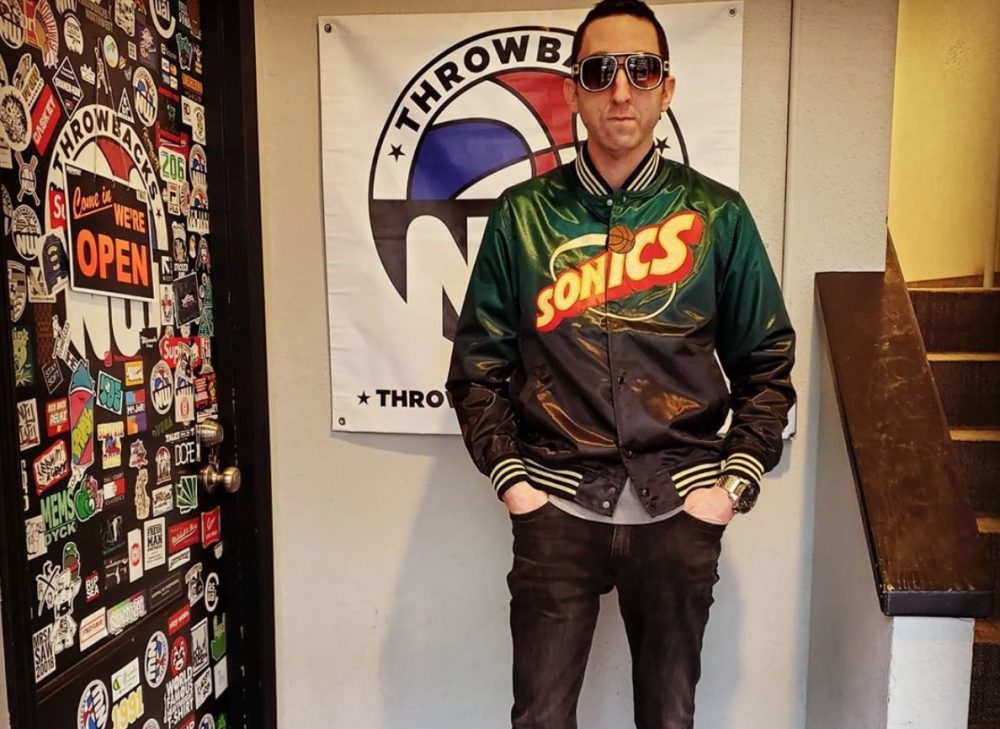
Photo from Instagram @dirty_harry_206
Dirty Harry: Memorable Moments From KUBE
So, take me back to KUBE and some of the different interviews that you did; what are some standouts?
Wow, boy, Jay-Z a few times. There’s always a running joke at the radio station, and I would always just kind of laugh and have fun with it, but if there was one person under that roof at the station that could have the ability to get Jay-Z to call in, or Diddy, or Mariah Carey, and all of these artists, just cause, it was me. I really learned, and maybe it really helped to come in from the record business to know how important relationships are and how important it is not to burn bridges. I am fortunate and blessed that I have relationships going back to ’96 that I still talk to today.
I was very active back then on my phone, but also on the two-way pagers. Everybody had the Motorola two-way pager. So I would send, you know, when I wanted Jay-Z to call in, I would send Jay-Z a note on the two-way and say, “Are you available this afternoon?” And he would call in.
50 Cent, one of the more memorable ones. One time 50 called in and we were interviewing him and he asked for a whole bunch of Sonics jerseys. The Sonics were upstairs, this was when we were on 190 Queen Anne Avenue. So, I went to a point of contact who worked for the Sonics and I said, “50 has requested a box of gear.” They brought down this massive box and 50 wanted me to send it to his house, so it was sent to his house. Once again, relationships. I reached out, sent him the shipping tracking number and he reached out and sent me pictures of him wearing it. so I mean, in terms of, you know, memorable interviews, that’s one. One of the most common questions that I get is who is one of your more negative experiences and I’d have to say it was Kanye West.
Really? That somehow doesn’t surprise me. What made it such a memorably terrible experience?
Kanye was in the studio with us and we posed a question saying, “Welcome to Seattle, what do you think about Seattle? What are your vibes here, you know, what’s your opinion?” and he looked at us dead on, and he said, “I have to be upfront and honest, the only thing going through my mind right now is styling all five of my Victorian-style mansions.” I’m like looking at him and I’m saying, “It’s not five mansions. It’s probably one at best, but it’s not five.”
Then it got even worse. He didn’t bring in a clean edit to a song that he had asked to be played on the air and he asked us to play it. He wanted to bleep it, you know, with his mouth. He had no idea of your traditional 16-18 second time delay in radio. If the FCC was to want to have an issue with an unedited song going across the air at 5 o’clock in the afternoon, it could be a big fine. It could be in the six figures and could even jeopardize the radio station’s license. We said no and he wasn’t too happy about it. At one point his bodyguard and his road manager were sitting to his left and to his right and they were kind of like elbowing him, like, dude get it together, lose that ego.
Then you have artists like Jay-Z and Destiny’s Child. When Destiny’s Child was in the studio with Beyonce, they were humble, respectful, and gracious. In my opinion, Jay has always been a larger household name than Kanye and you would think the ego would slow down a bit. I’ve just seen so many people, Taylor, that you can just be ruined by having a massive ego, and I don’t know, what good does it do someone? What good does it do someone to be like that? How about being that person that just walks in a room but almost stands in the back corner and just observes, doesn’t have to be in the dead center, all eyes on that person, you know?
Oh, and then there was the time we caught one of our interns sleeping with Tyrese in his dressing room backstage at Summer Jam. Then, one of the years that we had Snoop Dogg headline Summer Jam at the Gorge, I literally had to tell security to let me in the dressing room as he was passed out sleeping and the crowd was starting to get a little anxious, you know, 90-95 degree weather all day out at the Gorge, you want to see the headlining artist. It’s like, get him on the little golf cart and get him up the ramp and get him on that stage, whatever it takes.
Photo from Instagram @Dirty_Harry_206
So,talk to me about Summer Jam, how did that even get started?
It started way before I got there. It started, I think, with Tupac back in Cheney Stadium back in the early 90s, I want to say ’90, ’91? [It was 1993] But, when I came on board, we built the backstage bbq, everybody wanted an opportunity to be backstage. We would have a couple hundred listeners come out and really create an experience, get some of the artists to come, do meet and greets, do tours. Summer Jam was really just designed to have the biggest artists of the year and the new and upcoming artists.
I remember one of our points of contact from Interscope bringing Kendrick Lamar way before Kendrick, you know, blew up and he was there, did a couple of records, and now look at him. So, it was really designed to create the template that the fan base could properly react to knowing that this was the festival that they were going to see their favorite artist or favorite artists. We would keep the ticket prices in line with others at the time, I mean, everybody loved the Gorge, you know, the campground experience. White River didn’t have the camping experience.
Most years it was eight to ten artists. One year we did two days. Then we did an old school and new. The first day, that was Ice Cube, Too Short, E-40. Then the next day it was new stuff, so, we had Lil Wayne, Usher, Macklemore, Nelly. I know I’m forgetting names but, you know, it was the biggest artists of that genre, of that era, that we would have to represent the brand to create an outdoor pinnacle. Most years 22,000 people, some years it was a bit more but kept it right around 22,000.
Photo from Instagram @Dirty_Harry_206
What year did you get started working on Summer Jam?
Well, I left there in ’12 so, 2008, 2009? Maybe even a little earlier, but ’08, ’09.
So, that was right on the verge of live streaming and the digital era started. What was the transition like for that? Did you notice a big transition in the way that artists were found and how they became popular?
It was more of a – and it’s funny that you bring this up because I just had this conversation with some of the labels in New York about that and back then, it was really more about how powerful the label wanted to connect the overall branding efforts. Meaning that every label operates under a different flight plan. Some labels are a little bit more aggressive, some labels have more dollars than sense to play with, some labels, you know, want to take a new artist and build them around other artists on the platform, the showcasing of talent.
I really saw it when we did the jumbotrons, you’d really see that more with management being specific on what they wanted on those screens. So, if they wanted something promoted coming up, they had to deal with the changeover and cross over into higher stream placement. You’d see more of, kind of a mini built-in video-esque, mini escapade. You would see it sometimes on the low-level sponsorships with some of the localized labels that would sometimes sponsor, not in a full flight plan but sometimes on a smaller one. They would just want to be in front of everything. They’d want the jocks on stage talking about it, they’d want to be on the screens, they’d want to be in the video production on KUBE93.com, they’d want to be in the lead up in terms of the whole on-air level of execution.
So I mean, I’d see it, but it’s not nearly like the seed that it has blossomed into today. It was more like the mini stepping stones but you would see, like I said, more in terms of the labels and how impactful they wanted to be. Especially in a market, like Seattle, which has always been a pretty difficult market to program and stay number one. Especially now, I mean as techy as the market has gotten, people’s habits have changed. They’re not in their car, you know, flipping through their dials. People would always ask us, and speaking of engagements, Taylor, what’s radio’s biggest competitor? It’s always been the phone.
https://www.instagram.com/p/B5lncdBnoRU/
Dirty Harry: Thinking Outside The KUBE
I left KUBE in 2017. They, unfortunately, took a 100,000-watt radio station and put it on a 10,000-watt signal which was 104.9. They put on the 93.3 signal, a station called Power 93.3 to go right up against 92.5. That didn’t quite pan out the way it was expected to.
Brought back KUBE, brought back Summer Jam, decided to put it at the Tacoma Dome; that was canceled due to unforeseen circumstances. When you talk about the brand not really being there, the flight plan stays there. So, I left KUBE and had the opportunity to go into tech on the music side with a firm in downtown Bellevue. Did that, and still do that, partially. Then I had an opportunity to do quite a bit in the luxury real estate market, in terms of a lot of event placement with athletes and artists. A lot of them are in real estate but don’t get localized a bit, so I was with this boutique firm, that I still also work with.
I’ve really been focused on my music management and consulting, and my radio show. It feels great to be back on the air, on Rainier Ave four to six weekday afternoons, built out a nice team. I really enjoy my music management and consulting. I’ve got an artist in Atlanta, got an artist on the East Coast, I’ve got some artists here locally. I feel like I somewhat have the best of both worlds; being on the air, then having the ability to bring an artist on my show, show them some love, and play their song.
How did you get started with that?
You know, just from all my years of having all of my relationships with the labels, with managers, and knowing the right advice placement, knowing the right creativity, and knowing the right marketing. Staying in touch and staying in line with the business and how activated we need to be with video placement. Being an effective manager, you gotta be a good negotiator, got to have the relationships. Some artists want to just focus on getting into labels and some artists want to be independent so it’s just a matter of catering to their individual needs.
Did you decide that you wanted to do that and then started seeking out an artist or was it like an artist that inspired you to start managing?
I think it was just a combination of a few artists approaching me saying that they didn’t feel like they had the right representation at that given moment. They asked if I would have some conversations with them, which I did, and the building blocks picked up from there.
With your focus, now, on the community-centric Rainier Avenue Radio, is it mostly local based music?
Not really, it’s more mainstream, more national. We pretty much follow the charts, in terms of what the – I mean, we do local and I’m going to incorporate more local into my platform. Last time I checked, I don’t think that there’s anybody really – and this is important to me, I want to be able to and I’m going to be able to, I’m going to be bringing in local artists in my five o’clock hour and really giving them that experience and that real element of on-air love that really doesn’t exist at other properties and stations and markets, especially at five in the afternoon.
I’ve been thinking about how it’s gone from mainstream media denouncing what’s popular, to now, where, for example, Spotify’s algorithm will remember what someone listens to and find similar artists. It’s exposing a lot of new people directly to that artist’s targeted audience. But, as for you, who has connections around the industry, throughout the country, how are you finding some of the people that you’re interested in and who are some of those people?
Well, my guy Triggs, Snoop Dogg’s new artist based in Atlanta, is my guy. When he and I were introduced, I asked him a fairly important question. I said, “Up to this point, what has the label provided? What has the label given you to increase your overall branding efforts to be more recognized nationally?” There was a fair amount of stage opportunity with Snoop and without Snoop. But, as I said, when we talk about product placement and knowing his brand and knowing that, you know, he likes to take his shirt off on stage and likes to have that type of unique vibe and awareness, I said, “Has there been conversations about putting together an ad deal or a clothing deal or an alcohol deal?” He said, no.
So, that’s where relationships come into play. I reached out to one of the large national hat retailers and sent him 40 or 50 hats, he was wearing the hats on the tour with Snoop. A pretty iconic outerwear clothing company sent him a whole bunch of jackets and boxes of stuff and was wearing it on stage. Once again we’re taking relationships that have been there for a number of years and we’re making introductions and it looks good for the clothing brand, it looks good for the artist.
Then, it’s how do we take that to the next step and the way that we take that now to the next step is we put together individualized campaigns. We put together Triggs his own personalized hat collection that he could sell and he could be getting an ROI on his network and the company can be selling it, as well, and once again, everybody wins. So, that’s kind of the way I work. Triggs is someone who I am really excited to see what he continues to do.
Triggs “Foreva Win” ft. Dub City & JDub Music Video
Any other artists that you’ve been noticing?
There’s a kid named SASH, in New York, that I have a real good relationship with. He’s got a deal with Roc Nation. His mother and I are childhood friends and he’s been making a lot of noise, his song is forecasted to play in the Superbowl coming up. So that will be good. He’s got a distribution deal now that he’s got them behind him. Really big fan of his sound and his look. You know, him and I, we’ve had some really good conversations, he’s really into fashion and I’m really into fashion. We’ve talked about how we take and build out on a creative monumental step, how we take those two businesses because, you know, people don’t realize, at the end of the day, the music business is not some humongous, huge, business. I mean, it’s large, but the key true players, we kind of all know each other. Especially if you’ve been in it for 20-25 years.
SASH – “What Would A Champion Do?”
There are other artists that I’m engaged in and working with, but I’d say on a national level, other artists that I’m not working with that I see what they’re doing is, I mean, whether you’re a fan or not, based on some of the decisions they make, it’s no surprise but when we talk about Da Baby, the activation around that camp! I mean, when you have Diddy coming up to the SUV saying get out and shake your hand and say that you are the number one guy. Getting that testimonial from a mogul like Diddy is pretty powerful.
How many more ‘Babies’ are we going to see, though? We have Da Baby, we have Lil Baby, we have Baby from Cash Money.
I’m hoping that we move on. I’m calling the 2010s the Soundcloud era and, thankfully, that is done and over with and we can get rid of all of these Lil names and Baby names. I really think that we are moving past that first initial shock of having the internet and being able to upload whatever you want and being able to make your own stuff at the drop of a hat. I believe that we are moving into another artistic renaissance era. I think people are starting to learn how to use these tools and use them well to the point that their music is sounding a lot better now.
I always tell artists too, I mean, for the artists who are so gung-ho about getting a label deal… I just put together a merch campaign for an artist and the artist spent about 2,500 bucks and they sold out the entire amount of hoodies, t-shirts, and beanies that were ordered for the first round. I mean, it was about 7,900 dollar profit and that’s just on merch. Stuff where, if we, once again, get back to the commitment and consistency of ways that artists can keep all of the money instead of teaming up with a label who’s going to take a fair amount, that’s why I think you see more and more artists wanting to be more independent. There are certainly great things that labels have to offer but then there are things that, they feel, with relationships you can build out and strike without it too.
That was going to be my next question for you was, what is your stance on going the more independent route as opposed to sticking with a label and how do you think it’s going to pan out in this next decade?
I don’t foresee labels going anywhere. Labels have the dollars and sense behind them to be able to create that magic pedestal that people expect to see. You know, my last trip to New York I was with a very close personal friend of mine who has prime relationships with every single major label and he had an artist step into his office, right by Wall street, from Atlanta. The artist management crew threw $25,000 down on his desk and said, “I need your help.” My friend’s first question was, “Is this a conversation about getting in front of a label, or is this a conversation about staying more independent?”
The answer was independent and that $25,000 built him a mini west coast radio promo run. Started off in San Diego and went all the way up the west coast and got him the right publicity and the right press. To this day, this particular artist, that I’m told that I can’t mention quite yet because there might be a new deal in the works, has still stayed independent. The $25,000 that went into round one has already seen a pretty positive ROI, just in terms of merch and in terms of download streams. Then when we talk about the publishing and the opportunities on the publishing side, if it’s negotiated properly and there isn’t a label in the factor and it’s more on the independent side, then it could be huge numbers.
Photo from Instagram @Dirty_Harry_206
Dirty Harry: The Three C’s To Success As An Independent Artist
If there’s any other advice that you could give to upcoming artists on how to fully capitalize on themselves, what would it be?
I mean, I think really my three things are commitment, consistency, and communication. If you’re committed, stay committed. I understand that people have jobs, they have families, they have everything going on in their daily lives but, if you’re committed to being an artist and having your unique sound and having that platform then stay committed to it. Don’t just treat it like a hobby, do whatever you need to do, you know, reach out and get creative.
Think about your human Rolodex, maybe there is someone who has a business that wants to take a liking to what you’re doing and give you 3,000 bucks. Take that 3,000 bucks and put it into a merch campaign or put it into some sort of campaign that you can get a good return on, right? It’s like an investment. So that’s commitment.
Consistency is, you know, you see a lot of artists kind of do one-offs. They’ll work so hard for x amount of weeks for one show. How about creating weeklies where you can build out that fan base, if it’s 150 people or 300 people, then you got them coming to that plateau each week.
Then, communication. I think in any business if the communication isn’t there, and there are games being played that are distracting from what the core root value system really needs, I feel like that could, and I’ve seen it happen, it could mess up a lot of things. So, I would say for artists; don’t be afraid to reach out. I get artists hitting me up quite a bit on Instagram and every time someone hits me up, I always say, “Thank you for reaching out, I appreciate it, let me know if I can ever help or assist.”
I’m more than happy to have consultations with and really talk to an artist. We all have our own kind of radar guns. We can see, you know, are they serious, how far do they want to take it, what kind of budget do they have to work with. At the end of the day, I mean, if they don’t have a budget, things can still be built but it’s going to be a lot harder. That should be a t-shirt, “Everything is better with a budget.”
So I would say, don’t be afraid to ask for help, think about the relationships, think about what you want your defined flight plan to be. Is it your goal within three to six months to be able to get a radio interview? Is it your goal for three to six months to maybe get into a better studio, to maybe get a collaboration with another artist locally that might have a little bit more buzz going around them. So, I think there are multiple things that can be trapped in it’s just a matter of getting into the artist’s mind space.
Tune in to Traffic Jam with Dirty Harry on Rainier Avenue Radio weekdays from 4-6pm
RAPPER WEED: WHICH RAPPERS HAVE CANNABIS PRODUCTS IN THE MARKET?
10 UNDERRATED FEMALE RAPPERS YOU SHOULD LISTEN TO RIGHT NOW
9 RAPPERS FROM DETROIT YOU NEED TO KNOW THIS YEAR
